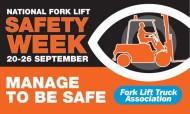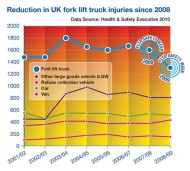 No one ever starts their day hoping to be injured. No supervisor looks forward to taking employees to casualty. And it should go without saying that no manager ever hopes to tell a family that their loved one was hurt – or worse – while at work.
No one ever starts their day hoping to be injured. No supervisor looks forward to taking employees to casualty. And it should go without saying that no manager ever hopes to tell a family that their loved one was hurt – or worse – while at work.
Yet the reality is that every day in Britain one worker is hospitalised or killed as a result of a fork lift truck accident.
These days, we’re all under pressure to deliver bigger, better and faster results with fewer resources, at lower cost. That pressure is even greater for managers, who are often required to juggle conflicting responsibilities and multiple roles.
And still it’s your duty, first and foremost, to protect the employees under your care.
It’s down to you to understand, establish and enforce good practice. You must notice when the safety rules are being broken or bent and you are the one who must identify potential accidents, and take action to prevent them. You select the staff, book the training, set the targets and – most importantly – influence the culture.
Training
Yet many managers and supervisors are required to perform all of these tasks without having undergone any fork lift truck specific awareness training.
 This means that in many warehouses important day-to-day decisions are made and implemented by supervisors who are no better equipped to recognise unsafe practice than the employees they are attempting to protect.
This means that in many warehouses important day-to-day decisions are made and implemented by supervisors who are no better equipped to recognise unsafe practice than the employees they are attempting to protect.
It’s clearly a dangerous position – and it’s a reality in far too many UK workplaces.
With this in mind, the Fork Lift Truck Association will be using this year’s FLTA Safety Conference (22nd September 2010) and National Fork Lift Safety Week (20th – 26th September) to reach out to Britain’s supervisors and managers.
While the Safety Conference will address fork lift truck safety from a more strategic angle, this year’s Safety Week campaign aims to provide supervisors with a basic understanding of the key risk areas, and what to look out for.
In the last few years fork lift truck accidents in the UK have fallen very significantly, reaching their lowest recorded level. This fall contrasts sharply with accident figures for other forms of workplace transport, such as Light Goods Vehicles (LGVs), which remained broadly static or even increased year-on-year, removing any suggestion that broader factors such as the economic downturn might have reduced workload risks.
 Most strikingly, fork lift truck-related deaths and injuries among members of the public plummeted last year to a full 59% below the average; a statistic the FLTA hopes is a reflection upon the broad targeting of its message through the Safety Week initiatives.
Most strikingly, fork lift truck-related deaths and injuries among members of the public plummeted last year to a full 59% below the average; a statistic the FLTA hopes is a reflection upon the broad targeting of its message through the Safety Week initiatives.
Despite this continued fall, it should be stressed that fork lift trucks remain the most dangerous kind of workplace transport, accounting for more deaths and injuries than the next two categories combined.
Trend
Although it’s clearly too early to know whether this is a permanent trend, and to what extent FLTA safety resources have contributed, it’s an encouraging sign that, with concerted effort and a little more attention to safe practice, our industry’s costly accident toll can be improved.
Everyone has a part to play and it will only take a few minutes of your time today to do you bit. By simply familiarising yourself with the key issues affecting fork lift truck safety, you’re going a long way towards making your workplace a safer environment. So, when considering fork lift truck operations, manage to be safe.
David Ellison, Chief Executive of the Fork Lift Truck Association




Comments are closed.